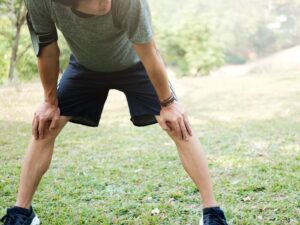Manage Knee Problems with Ayurveda
What is knee problems?
Knee problems can affect people of all ages, and there are various contributing factors including: injuries, mechanical problems, types of arthritis, and other conditions. Knee pain can range from mild discomfort to severe pain, making it difficult to perform everyday activities.
Common causes of knee problems
- Injuries: Ligament injuries (such as ACL tears), meniscus tears and fractures can cause knee problems.
- Arthritis: Osteoarthritis, rheumatoid arthritis and gout are common types of arthritis that affect the knee.
- Mechanical problems: A dislocated kneecap, hip or foot pain that changes how you walk, or a torn meniscus can lead to knee pain.
- Patellar tendinitis: Inflammation of the tendons can cause knee pain, particularly in athletes who run or jump frequently.
Symptoms of knee problems
- Swelling and stiffness
- Redness and warmth to the touch
- Weakness or instability
- Popping or crunching noises
- Inability to fully straighten the knee

Ayurvedic perspective on knee problems
In Ayurveda, knee problems are often associated with an imbalance in the Vata dosha, which is responsible for movement and circulation. When Vata is aggravated, it can cause dryness, stiffness, and pain in the joints. Kapha imbalances can also contribute to knee pain by causing swelling and heaviness.
Managing knee problems with Ayurveda
- Herbal remedies: Knee inflammation and pain can be reduced with herbs like Ashwagandha, Shallaki, Guggulu and Nirgundi. These herbal remedies for knee pain are effective in providing natural knee pain relief.
- Panchakarma therapy: Detox treatment that helps remove toxins from the body, balance the doshas, and improve overall health. Panchakarma for joint pain is highly recommended in Ayurveda.
- Abhyangam (oil massage): Regular massages with warm medicated oils like Mahanarayan oil or Dhanwantharam oil can help improve circulation, reduce pain, and enhance joint flexibility.
- Kati vasti: A specialised Ayurvedic treatment where warm medicated oil is pooled around the lower back to help alleviate the agitated Vata, offering relief from back pain.
- Yoga and Pranayama: Specific yoga poses and breathing exercises can strengthen the back muscles, improve flexibility, and reduce pain.
- Diet and lifestyle changes: Eating a Vata-pacifying diet, staying hydrated, and maintaining a regular exercise routine can help manage back pain effectively. A Vata balancing diet is essential for holistic back pain treatment.
Knee problems can have a significant impact on your daily life, but Ayurveda’s holistic approach can help you manage the condition and reduce the pain effectively. At the Indian Ayurveda Centre, we provide a wide range of Ayurvedic therapies to help you lead a pain-free life. Contact us today for more information or to book a consultation.
Please note that all Ayurvedic therapies mentioned above are non-medical and non-invasive procedures. The therapeutic recommendations are made in consultation with our senior consultant, Nicy Augustine Kachappilly (BAMS, Calicut University, Kerala, India; a non-medical qualification in Ayurveda).
- 8186 3452
-
Monday, Thursday & Saturday 6pm - 9pm
By appointment only -
Blk 352, Clementi Ave 2 #01-101
Singapore 120352 -
Dover Exit A, Bus 74 (2nd bus stop)
Clementi Exit B, Bus 52, 154 (3rd bus stop)
